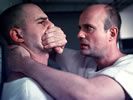Eye For Film >> Movies >> Das Experiment (2001) Film Review
Before Downfall, there was Das Experiment, Oliver Hirschbiegel's 2001 study of claustrophobia and the misuse of power.
Based on a true story, the notorious Stanford Prison Experiment in 1971, the film tells the story of 20 men who volunteer to be placed into a makeshift prison for 12 days. Once inside, some are chosen to be guards whilst the others will act the role of prisoners, a process that involves abandoning their names, their clothing and their civil rights for the duration of the experiment.

The job of the guards is simple, maintain peace and order at all times without using physical violence.
At the heart of the film is Tarek, prisoner 77, an undercover journalist who is secretly filming from inside the prison, hoping to sell his exclusive once it's over. Tarek underestimates his own role in the experiment, though. He starts in irreverent mood, thinking it's just a game until he sparks a conflict with one of the guards, Berus. The two adversaries drive each other on relentlessly forcing the experiment to become darker, more grotesque, as each man fights for his own idea of power and identity.
Das Experiment asks what happens when good people are put in an evil place. Does humanity win over evil, or does evil triumph ? Also, it examines the role of memory when faced with extreme stress and deprivation. Whilst the film is based on a true story, it's cinematic influences can be traced back to Samuel Fuller's masterpiece Shock Corridor and, to a lesser extent, Chris Marker's La Jetee. The comparisons to Shock Corridor are there for all to see but it's also worth noting that in all three films, the protagonists are obsessed with the memory of a girl, often using that memory as an anchor to cling on to a more idealised past, a potential escape route from the situation they find themselves in. For Tarek, as the situation becomes more extreme, the memories become stronger and stronger as he attempts to block out the present and focus on the past and a possible future with the girl.
Das Experiment is more than simple homage and pop psychology, largely due to it's director. In his first film, Hirschbiegel manages to create an entirely dark world, both inside and outside of the prison. Only in the final frames do we see any natural daylight at all, which offers stark contrast to everything we've seen before. The sense of claustrophobia, the complete lack of space, carefully manipulates the viewer and is at times genuinely unnerving. Consequently, it's difficult to find any real distance between yourself and the film as you become more and more absorbed. As for the characters within the prison, there appears to be escape route for the viewer. A sparse script and real sensitivity from the actors, none of whom overplay their role, only adds further to the film's power. Moritz Bleibtreu (Run Lola Run) is particularly strong as Tarek, while Justus Von Dohnanyi is positively menacing in the role of the sadistic guard Berus.
Hirschbiegel would, of course, develop these themes further in Downfall a few years later and in many senses, Das Experiment can be seen as a companion piece to the latter. As a debut work it's nothing short of astonishing, a director completely in control of the film and the viewer.
This is cinema not for the faint hearted, where you have to go into the dark places first before you can see the light.
Reviewed on: 09 Apr 2006




















